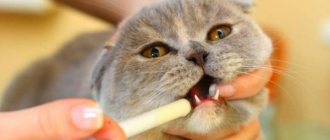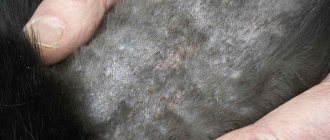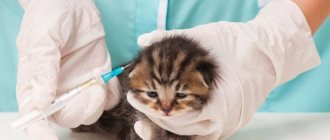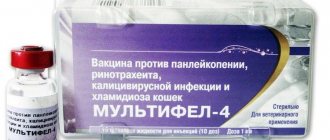If you decide to have a kitten as a pet, you should be aware that, in addition to great joy, it is also a huge responsibility.
A caring owner carefully monitors the health of his pet and takes all preventive measures to ensure that the animal is maximally protected from contracting various infections. The following are used as preventive methods to combat infectious diseases:
- vaccination of animals;
- avoiding contact with street cats;
- excluding the presence of an unvaccinated animal on the street;
- maintaining careful hygiene of the premises.
Vaccination of cats is a method that provides a high percentage of guarantee that your animal will not become infected with a serious disease, or, if infected, the disease will be easier and without complications.
Important arguments in favor of vaccinating cats
Does my cat need to be vaccinated? Before we begin to understand the intricacies of veterinary medicine and the most important recommendations, let's remember what we know about animal vaccination in general. Vaccination (vaccination) is a whole complex of measures, including the preparatory stage, the procedure for administering the protective drug and the post-vaccination stage.
Interesting: the concepts of “vaccine” and “vaccination” are somewhat different. Not many people know this, and often use both medical terms as synonyms. Differences: a vaccine is a medical product that contains a weakened viral strain; when it is detected, the animal’s body begins to produce protective antibodies itself, forming the necessary immunity. “Vaccination”, also known as “vaccination”, is the procedure or process of administering the vaccine.
Vaccination result:
- After vaccination, a cat acquires enhanced immunity;
- The development of severe, including fatal, cat diseases is excluded;
- There is no need to worry about the possibility of contracting rabies;
- No worries about the cat being outside.
Do cats need vaccinations? A definite answer “yes” can be obtained not only from specialists, but also from most ordinary lovers of furry pets. Vaccination is an almost 100% way to avoid serious cat health problems.
Another argument in favor of vaccinations is that the diseases they are aimed at preventing are difficult to treat or cannot be treated at all. So preventive vaccination is the only option to protect your cat.
Is it possible to refuse vaccination?
Cat vaccination process
Some cat owners deliberately do not vaccinate their pets. Their explanation: animals must develop their own immunity against various infections. The main thing they forget is that a domestic cat is not a wild animal, and its body is more susceptible to the action of bacteria and viruses. Even outdoor cats are better protected than indoor cats.
The statement “a cat never goes outside and can’t catch anything” is also easily broken by criticism. Most causative agents of cat diseases can enter a house or apartment with their owners or simply be blown through an open window by the wind.
Whether to vaccinate or not is a personal decision for each cat owner. But fortunately for pets, those who ignore vaccination are becoming fewer and fewer over time.
Why do cats need vaccinations?
Vaccinations for cats differ little from human vaccinations and any other vaccinations. The animal is injected with a drug containing weakened bacteria and viruses. When they enter the body, they provoke the production of specific antibodies, which in turn form a stable immune defense against harmful microbes and various diseases.
It is noteworthy that a cat must be vaccinated, even if the animal is constantly at home. The fact is that viruses that can infect a pet are literally everywhere. They can be found in the air, water and food of a cat, and a person can also carry the bacteria on his clothes.
The first vaccinations for a kitten are given at a very early age - 2 months. This helps to form a strong immune system and protect the baby from external harmful influences. Vaccination is carried out strictly in accordance with the approved schedule; before the injection, double deworming must be carried out with a break of 10 days. You also need to treat fleas and ticks on the animal’s body.
Immediately before the vaccine is administered, the pet is examined by a veterinary doctor, and additional tests are prescribed if necessary.
What does vaccination help with?
Modern veterinary science, thanks to the creation of preventive vaccines, is able to prevent the development of many common cat diseases, which can often lead to very sad consequences. Here are the vaccinations your cat needs:
- Vaccination against rhinotracheitis (feline herpes);
- Vaccination against feline panleukopenia (distemper in cats);
- Administration of the chlamydia vaccine;
- Microsporia and trichophytosis (vaccination of cats against lichen);
- Calcivirosis (“cat flu”).
Dogs that are given certain medications, such as cyclophosphamide, may also suffer from cystitis.
Does a cat need a rabies vaccination?
Vaccination of cats against rabies is a separate topic, which is why it was not mentioned above. This disease affects not only animals, but also humans. Are cats vaccinated against rabies? Not only do they do it, in some cases this procedure is even regulated by law.
It turns out that vaccinating a domestic cat against rabies is a guarantee of the safety of not only the pet itself, but also its owners. This means that it is necessary and obligatory. Don't neglect it. It is very easy to catch a dangerous disease; it is easily transmitted to humans. If he is bitten by a cat, a rabies vaccination can save the situation.
How to prepare a cat, cat, kitten for vaccination
Preparing your pet for vaccination may take some time. 1-2 weeks before vaccination, the animal must be given an anthelmintic drug. Fortunately, the choice of funds is quite wide, so you can choose the most suitable option. For example, it can be served directly with food or the drug can be dripped onto the withers without causing any protest in the pet. Kittens are also allowed to undergo preliminary anthelmintic treatment.
Deworming before vaccination
Rabies vaccination for a cat: when to vaccinate
Deworming before vaccination is carried out so that the cat can develop good immunity to the vaccine. Parasites harm the immune system by weakening it, resulting in decreased antibody production. Of course, even a vaccinated kitten is susceptible to diseases in this state. That is why it is necessary to expel helminths before vaccination.
If more than five months have passed since the last time you took anthelmintic drugs before vaccination, then you should not wait for repeated deworming. Vaccination should be done after 10 (not earlier) or more days after treatment of the animal. As a rule, this is done twice with a break of 10-15 days. This will destroy not only adult helminths, but also their eggs, which will hatch after 10-12 days. Anthelmintic drugs are used based on the cat's weight, so the pet should be weighed before each dose.
Important! Pregnant and lactating cats are prohibited from deworming!
Antihelminthic prophylaxis should be carried out 10 days before mating. Kittens are treated with anthelmintic drugs only 21 days after birth (you should consult a veterinarian before the procedure). Do not forget that some types of worms are dangerous not only for cats, but also for humans. Therefore, during the deworming period, you must strictly observe the rules of personal hygiene.
Deworming before vaccination
Mandatory vaccinations
It is impossible to force its owner to vaccinate a cat. But there are life circumstances in which vaccination and relevant documents confirming the vaccination of the animal (veterinary passport with marks) are required. First of all, this is traveling abroad.
Without mandatory vaccinations, the cat and its owner simply will not pass border control. So, which vaccinations against which diseases can be considered mandatory:
- Panleukopenia;
- Rabies;
- Calcivirosis;
- Rhinotracheitis.
To travel outside the country, vaccinations must be done no later than 1 month before the departure date.
It’s interesting: even the hotel administration may require a passport with mandatory vaccinations to check in with a pet; it will also come in handy when traveling by rail within our country and the CIS countries, especially in Western Europe.
Without what vaccinations will a cat not be allowed abroad?
Every self-respecting cat or kitten should have a veterinary passport, especially if the owner plans to travel abroad with his pet. Without mandatory vaccinations against rabies, calcivirosis and rhinotracheitis (viral respiratory diseases) and panleukopenia, the animal simply will not be able to pass inspection. Vaccination must be completed at least 30 days, but no more than 11 months before departure.
Note! A vaccination certificate may also be required upon check-in at the hotel.
Without what vaccinations will a cat not be allowed abroad?
Vaccines and their types
Currently, all preventive vaccines can be divided into several groups, which differ in their functional characteristics and composition of active ingredients:
- Polyvalent and monovalent . The former protect the animal from several diseases at once, the latter promote the production of antibodies to only one pathogen;
- Active and inactive . The first contains strains of weakened but still living pathogens, the second contains already “dead” pathogens. Inactive vaccines cannot maintain their preventive activity for very long.
Vaccines for animals
Currently, most experts give their preference to polyvalent drugs that can build immunity not only in adult cats, but also in kittens. An additional anti-rabies complex is often added to the main component of the vaccination, aimed at preventing rabies in animals. The most famous and widely used drug for cat vaccination is Nobivac.
Timing and schedule of vaccination
Now everyone knows what vaccinations are given to cats, but a new important question arises for cat owners: at what age are cats vaccinated? Early enough. The first vaccination is given to kittens at the age of 8-12 weeks. Their body is already stronger and is able to take on a small preventive infectious blow. A month later the vaccination is repeated. Then the cats are vaccinated annually.
Important: the age of cats for vaccination is very important! The first vaccination should not be done before two months. This procedure will simply be useless. The kitten's passive immunity, acquired from maternal feeding, will respond to the vaccine and destroy all pathogens contained in it. Immunity will not be formed.
In very rare cases, if there is a high risk of infection, vaccination is carried out for a period of 6 weeks. The kitten has not yet been weaned from the cat, but its milk is no longer the main food component.
Subsequently, adult cats are vaccinated every year. Sometimes more often, but according to the recommendations of specialists. You can follow the following general cat vaccination schedule:
| Schedule for mandatory vaccinations | |||
| Disease | First vaccine | Repeated vaccination | Revaccination |
| Rhinotracheitis + calicivirosis + panleukopenia | 8-12 weeks | A month later | In a year |
| Rabies | 8-12 weeks | Not produced | Annually or once every 2-3 years (depending on the drug administered) |
Recommended vaccinations are also included in the cat vaccination schedule:
| Recommended Vaccine Schedule | |||
| Disease | First vaccine | Repeated vaccination | Revaccination |
| Chlamydia | 9-12 weeks | A month later | In a year |
| Infectious peritonitis | 16 weeks | 20 weeks | Once a year |
| Ringworm (trichophytia, microsporia) | 8-9 weeks | 10 weeks | In a year |
The timing of vaccination depends greatly on the drug used. Modern veterinary pharmaceuticals are capable of creating vaccines to protect domestic animals from some infectious diseases for up to 3 years.
If the schedule is off
Situations where people forget about vaccinating a pet arise quite often. There is no need to be upset: not all is lost. You just need to contact a veterinarian, who will tell you what to do correctly in such a situation and adjust the vaccination schedule taking into account unforeseen circumstances.
How to vaccinate yourself
Vaccination at a veterinary clinic has one significant advantage: obtaining a veterinary passport. If you don't need it, you can vaccinate yourself. This saves you from the need to go to the clinic and pay for veterinarian services, and the cat from unnecessary stress and the danger of catching an infection in the clinic. Recommendations on how to give an injection to a cat are very simple:
- Pay attention to the choice of vaccine. Domestic drugs are much cheaper than imported ones, but animals tolerate them less well. Therefore, it is better to slightly increase the vaccination budget and buy one of the proven drugs: Nobivak, Merial or other foreign-made vaccines. The packaging always indicates which infections the vaccine is effective against. Be sure to inspect the packaging and find out the expiration date of the vaccine;
- For successful vaccination, the animal must be absolutely healthy and eat well. Just as in the case of vaccination in a clinic, before the procedure, the cat needs to be given anthelmintics 10-14 days before the procedure;
- when vaccinating with two drugs, two syringes should be used; insulin syringes with thin needles are best (if the amount of drug administered is less than 1 ml);
- Before the procedure, you should wash your hands, prepare everything you need and do not worry too much - your pet will quickly pick up on the excitement;
- It's easy to give an injection. Draw the drug into the syringe, then release excess air and part of the drug, holding the syringe with the needle up. The remaining vaccine volume must exactly correspond to the recommendations in the drug instructions;
- then secure the cat. It is more convenient if someone else holds the animal, although many cats quite calmly give injections;
- pull up the skin between the shoulder blades and inject into the subcutaneous space;
- The needle must be inserted quite smoothly, without jerking, but quickly. As soon as the needle is in the desired position, the resistance disappears, and you will clearly feel the right moment. The injection itself is not carried out with one press of the piston; introduce the drug gradually;
- Rub the injection site a little.
If the owner is not too nervous, the procedure is quick and almost painless. Therefore, the main thing is to calm down, and only then pick up the syringe.
Most animals tolerate vaccination calmly, but it is necessary to carefully monitor the cat’s behavior after vaccination to exclude the possibility of complications. Warning signs are:
- repeated vomiting and diarrhea;
- very high temperature;
- Lethargy after vaccination is normal. But if the animal refuses to eat and behaves apathetically for more than a day after the procedure, you should consult a doctor.
But most often, vaccination is easy, just provide the animal with a few hours of rest and access to food and water. If the cat is used to walking, it is better not to let it go outside during the first day. Otherwise, the animal will quickly recover from stress and return to its previous lifestyle.
If you are unsure of which vaccinations to get or doubt your ability to get a shot, it is best to contact your veterinarian. A professional doctor will give all the necessary recommendations and carry out the procedure as safely as possible for your pet, providing it with protection from life-threatening and health-threatening infections.
Dead vaccines
- Felovax (Fel-0-Vax) - vaccine against panleukopenia, rhinotracheitis, calicivirus and chlamydia; The vaccine contains inactivated feline panleukopenia virus, two strains of feline calicivirus, inactivated feline rhinotracheitis virus and the causative agent of feline chlamydia (Chlamydia psittaci). Contains thimerosal, neomycin, polymyxin B and amphotericin B as preservatives. Manufacturer Fort Dodge Animal Health, USA.
- Felovax LV-K (Fel-O-Vax Lv-K) is a vaccine against viral leukemia. Manufacturer: Fort Dodge Animal Health, USA.
- Multifel is a vaccine against panleukopenia, rhinotracheitis, calicivirus and chlamydia; The vaccine contains inactivated feline panleukopenia virus, two strains of feline calicivirus, inactivated feline rhinotracheitis virus and the causative agent of feline chlamydia (Chlamydia psittaci). , Russia.
- ChlamyKon is a vaccine against feline chlamydia (strain K-1). Inactivated vaccine. Produced by JSC Vetzverotsentr, Russia.
- Nobivac rabies Vaccine against rabies, contains an inactivated culture of the rabies virus. Manufacturer: Intervet Schering-Plough Animal Health, Netherlands.
- Rabizin - vaccine against rabies; contains an inactivated strain of rabies virus GS-57 WISTAR. Manufacturer: Merial S.A.S. (Merial SAS), France.
- Leukocell 2 (Leukocell 2) Vaccine against viral leukemia; contains inactivated feline leukemia virus (FeLV) and FOCMA antigen. Manufacturer: Pfizer Animal Health, USA.
Live vaccines:
- Leukorifelin is a vaccine against panleukopenia, rhinotracheitis, calicivirosis; contains attenuated feline panleukopenia virus, a solution of the glycoprotein fraction of feline herpesvirus and purified feline calicivirus antigen.
- Quadricat is a vaccine against panleukopenia, rhinotracheitis, calicivirus and rabies; contains attenuated feline panleukopenia virus, a solution of the glycoprotein fraction of feline herpesvirus, purified feline calicivirus antigen and inactivated rabies virus. Manufacturer: Merial S.A.S. (Merial SAS), France.
- Nobivac Tricat - vaccine against panleukopenia, rhinotracheitis, calicivirosis; contains attenuated feline panleukopenia virus (Bristol strain), a solution of the glycoprotein fraction of feline herpesvirus (strain G 2620) and purified feline calicivirus antigen (strain F9). Manufacturer: Intervet Schering-Plough Animal Health, Netherlands.
- Nobivac FORCAT - vaccine against panleukopenia, rhinotracheitis, calicivirus and chlamydia; The vaccine contains inactivated feline panleukopenia virus strain MW-1, feline calicivirus strain F9, feline rhinotracheitis virus strain G 2620A and chlamydia strain Baker. Manufacturer: Intervet Schering-Plough Animal Health, Netherlands.
- Felocell CVR (Felocell CVR) - vaccine against panleukopenia, rhinotracheitis, calicivirosis; contains live attenuated strains of infectious rhinotracheitis virus, calicivirus and feline panleukopenia virus. Manufacturer: Pfizer Animal Health, USA.
- Purevax Manufacturer Merial S.A.S. (Merial SAS), France. Purevax RCP - vaccine against panleukopenia, rhinotracheitis, calicivirosis; contains attenuated feline rhinotracheitis herpesvirus, inactivated feline calicivirus antigens and attenuated feline panleukopenia virus; Purevax RCPCh - vaccine against panleukopenia, rhinotracheitis, calicivirus and chlamydia: contains attenuated feline rhinotracheitis herpesvirus, inactivated feline calicivirus antigens and attenuated feline panleukopenia virus, as well as attenuated feline chlamydophila (the causative agent of feline chlamydia).
- Purevax FeLV - vaccine against viral leukemia; contains a recombinant canarypox virus in the genome of which the FeLV gene is expressed using genetic engineering. Manufacturer: Merial S.A.S. (Merial SAS), France.
- Primucell FIP - vaccine against infectious peritonitis: contains attenuated coronavirus. The vaccine is administered through the nose. First used in 1990. Manufacturer: Pfizer Animal Health, USA.
- Katavac Chlamydia is a vaccine against feline chlamydia. Manufacturer: Fort Dodge Animal Health, USA.
All companies that produce these drugs recommend revaccination with the same drug as the primary vaccination.
The effectiveness of vaccination can be significantly reduced due to the use of immunoglobulins, sulfonamides and antibiotics a few days before the vaccine is administered and a month and a half after.
Special conditions are required for transportation and storage of vaccines. Vaccination with a spoiled vaccine can cause severe illness and even death of the animal. Therefore, vaccines should never be dropped from hands or on the market.
Vaccinations completed are recorded in the veterinary passport. This passport is necessary for participation in exhibitions, when traveling abroad, as well as for proper vaccination throughout the life of the animal.
Vaccines for the treatment and prevention of lichen (trichophytosis and microsporia):
Microderm, Polivac TM for cats, Vakderm - F for cats.
These vaccines create immunity of short duration (2-3 weeks). In addition, there is a high probability that a healthy animal will get shingles after vaccination - the vaccines are live. It should also be kept in mind that shingles is not fatal. It is easily treated and can be avoided by following basic hygiene and pet care rules. Therefore, these vaccines are used mainly for TREATMENT, not PREVENTION, of lichen.
Preparing for cat vaccination
Cat owners know that they need to do some preliminary preparation before vaccination. First of all, it involves deworming. The main reason for carrying out this procedure is that anthelmintic drugs eliminate the appearance of many unnecessary complications, promote the active production of antibodies, without dispersing immune forces to fight the parasites present in the cat’s body.
It is not necessary to deworm a cat immediately before vaccinations. First, the animal is examined for the presence of external parasites (fleas, ticks, lice), and if they are present, treatment is carried out. A few days after this, deworming can be carried out.
Measures to remove intestinal parasites must be carried out no later than 15-25 days before the vaccination itself.
Interesting: whether or not to feed a cat before vaccination is another point that attracts the attention of pet owners. In fact, it is not that important. Because whether a cat is full or not has no meaning for vaccination.
Vaccination for a cat: rules and recommendations
After deworming, the cat is not vaccinated immediately. Before administering the vaccine, it is necessary to examine the animal. His general condition, temperature, tests are important components of the conclusion about the possibility of vaccination. If everything is fine with the cat, the main procedure of administering the vaccine begins. It takes no more than a minute, sometimes even seconds. Often the vaccination will consist of not one, but two injections. As mentioned above, the second injection is the introduction of a rabies preventative.
There are no trifles here: the correct choice of drug, injection skills, consultation on possible complications - these are the main arguments in favor of the fact that vaccination should be done by veterinarians.
Vaccine selection
The correct choice of medication for vaccination is one of the main components of “immune” success. Professionals are guided by the following rules:
- young cats are imported products with a mild effect; adult cats can be vaccinated with a variety of drugs;
- the instructions are required to be studied;
- Compliance with expiration dates is an important condition for ensuring the effectiveness of a medicinal product.
Information about vaccination must be recorded in the veterinary passport. Usually a special sticker is glued into it, which is included with the administered drug.
Self-vaccination
Some people vaccinate their pets themselves. According to veterinarians, this is an additional health risk. Not every cat owner is able to give the injection correctly, much less has sufficient qualifications to select the drug and its dosage. The result is a visit to the veterinary clinic, but not for vaccination, but to eliminate the consequences and complications.
Rules for vaccination and revaccination
Vaccination is a very responsible event, before which your pet needs to be carefully prepared and its health status checked. It is important to check that on the day of vaccination the kitten is:
- active and cheerful;
- body temperature did not exceed 38-39°C;
- there was no discharge from the eyes, nose, as well as sneezing and coughing;
- the animal ate well.
Before vaccination, communication with other cats that show signs of illness is strictly prohibited. It is also important to remember that only pets over 2 months of age are eligible for vaccination.
10 days before the vaccine is administered, fleas and ticks on the animal’s fur and body should be treated. This can be done using special drops or collars.
They also carry out deworming, ridding the pet of possible infection with worms. It is better if this procedure is carried out twice with a break of 10 days.
It is not recommended to vaccinate within 3 weeks after surgery, if any. When treated with antibiotics, the medical tap is effective for 2 weeks. After this period, if all health indicators are present, the animal is vaccinated.
If the pet was picked up from the street, you need to undergo the necessary tests that will show the presence or absence of antibodies to certain types of diseases in the blood. It is strictly forbidden to re-vaccinate an animal.
The owner of a pet should obtain a veterinary passport, which will record the vaccination schedule, medications that were used and all health indicators of the pet.
To carry out vaccination, you need to choose an experienced doctor who will not allow violations during the procedure. Otherwise, complications or unwanted side effects may develop.
It is also better to entrust the choice of vaccine to a professional. However, you should adhere to the general rules for selecting medications:
- for a young kitten it is better to choose imported vaccines, since their effect on the body is milder;
- Vaccination is administered strictly in accordance with the instructions;
- You must first make sure that the expiration date of the substance is in accordance with the expiration date; it is unacceptable to use expired medicine.
For half an hour after administration, you need to sit within the walls of the veterinary clinic, observing the cat. At this time, an allergic reaction may develop. Therefore, it is better to be closer to the doctor at this moment.
Complications and side effects
Negative consequences of vaccination are unlikely, but their occurrence is not excluded and depends on the state of the animal’s body. Although the risks are minimal, your cat may develop the following complications:
- Allergy. Observed in the first 15 minutes after injection of the drug. Signs: drooling, breathing problems. Since veterinarians do not advise leaving the clinic for half an hour, timely assistance with the use of antihistamines solves the problem;
- Swelling, redness at the injection site. It does not pose a serious danger and is not accompanied by other symptoms. The irritation goes away quickly, the cat’s lump disappears after vaccination, but if purulent formations form, you should immediately consult a doctor;
- Incubation. If the infection in the cat’s body was in the incubation period at the time of vaccination, a sharp development of the disease begins. If quarantine is observed before vaccination and a thorough examination by a specialist, this negative effect is excluded.
After vaccination, the cat may be lethargic or, on the contrary, hyperactive, there may be slight disturbances in appetite, and a slight increase in temperature. Most likely this will be the result of stress.
Important: cats picked up on the street cannot be vaccinated without prior quarantine and testing. Vaccination not only may not help, it can provoke illness, which will greatly harm a pet taken from the street.
Vaccination done. What to do after vaccination?
After vaccinating your cat, you do not need to leave the veterinary facility immediately. It is necessary to monitor the cat’s condition, and if it suddenly worsens, the veterinary office will be at your arm’s length.
Once at home, you need to pay attention to the condition of the animal for several weeks. Usually a cat is lethargic after vaccination; he needs to be provided with good nutrition and protected from possible negative factors (change of residence, water treatments, excessive activity).
Any cat owner should monitor their health. Vaccination is the only way to protect them from contracting deadly diseases. If you have vaccinated your cat against rabies and other diseases correctly, then your furry friend will always be full of strength, and his owner will not experience any nervous shock related to the well-being of his furry pet.
How much does a cat's vaccination cost?
The cost of cat vaccination is not prohibitively high and is affordable to everyone. Compared to the problems that can be caused without vaccination, the cost is very much worth it. For example, the price of rabies vaccination for a cat is in no way comparable to the financial, moral and time losses that may arise if you refuse to vaccinate your beloved “fluffy” in a timely manner.
Below are the prices for vaccinations at the Univet veterinary clinic.
| VACCINATION OF CATS PRICES | ||
| Vaccine name | Cost, rub) | Note |
| Nobivak Tricat Nobivac Tricat R | 950 1200 | Cat vaccination includes:
|
| Nobivak Forcat Nobivak Forcat + R | 950 1200 | |
| Quadricate | 1200 | |
| Felovax Felovax + Nobivac Rabies | 950 1200 | |
| Purevax FelV (feline viral leukemia) | 1200 | |
| Purevax RCP (calicivirosis, panleukopenia, rhinotracheitis) | 950 | |
| Purevax RCP (calicivirosis, panleukopenia, rhinotracheitis) + Rabizin (or R) | 1200 | |
| Purevax RCPCh (chlamydia, panleukopenia, rhinotracheitis, calicivirosis) | 1450 | |
| Purevax RCPCh (chlamydia, panleukemia, rhinotracheitis, calicivir) + Rabizin (R) | 1450 | |











